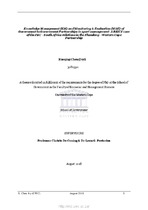| dc.description.abstract | Government to Government (G2G) partnerships between countries in the BRICS partnerships have significantly increased and with it, the need for more effective strategic management and operational coordination but also for evidence-based decision-making. In this process, improved KM, as well as M&E of outcomes and impacts has become prominent and essential requirements for evidence-based decision-making. The Millennium Development Goals (MDGs) emphasise the need for a global partnership for development with a focus on a new development paradigm that emphasise results, partnership, coordination, and accountability (Picciotto, 2002:3). Subsequently, the 2030 Agenda for Sustainable Development further strengthened the importance of the global partnership in the implementation of the Sustainable Development Goals (SDGs), recognises that the implementation of the SDGs is a challenge for governments and therefore seeks to strengthen the global partnership by calling upon all stakeholders to take part in implementing the SDGs.
In this context, the study investigated the need for knowledge management (KM) as well as Monitoring & Evaluation (M&E) systems in G2G partnerships such as the partnership of Shandong China (PRC) and the Western Cape Government (WCG) in South Africa. This study focused on the sport management aspects of such a partnership, although such systems may also be relevant to economic, tourism and other partnerships programmes.
The research investigation focused on the relevance of KM and M&E systems in sport management on G2G partnerships, as well as the possible benefits of such systems. Readiness Assessments for the establishment of KM and M&E systems were conducted with respect to the Shandong -Western Cape Government (WCG) in PRC and South Africa.
The research methodology consisted of a qualitative approach and a case study was developed of the Sport Exchange Programme (SEP) as a component of the partnership between Shandong PRC and Western Cape Government (WCG) South Africa. The research included a desktop study of primary documentation including the formal agreements, Memorandum of understanding (MoU), regulations and programme annual reports, semi-structured interviews with officials and public sector managers of both governments in PRC and South Africa, as well as focus group discussion, interviews with specialists and experts were also conducted. | en_US |

